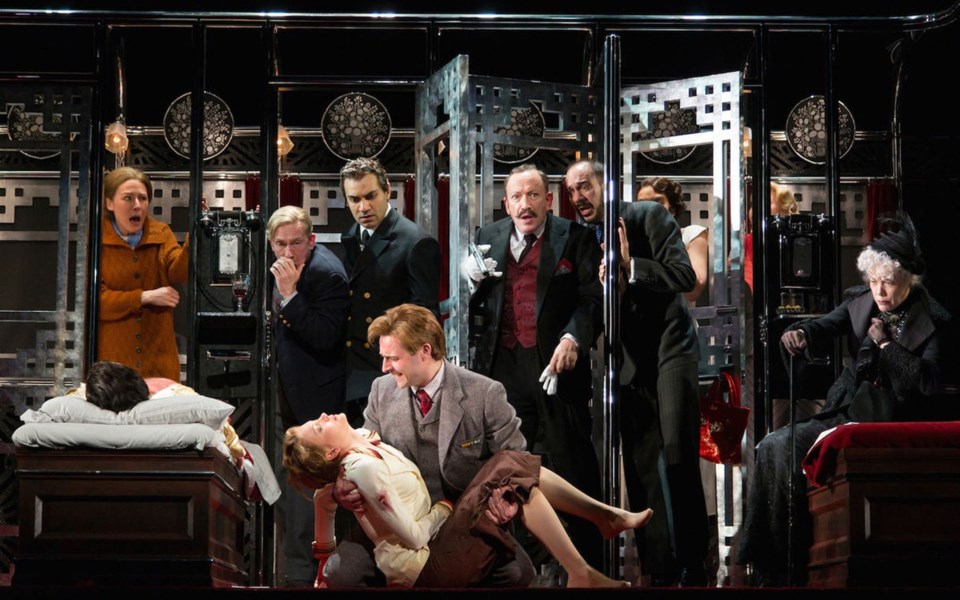In the '80s, because there was nothing else to do, adults used to host these "Murder Mystery Dinner Parties," which were essentially role-playing games but with booze. Everyone would get a "character sheet" with their persona for the evening — posh heiress, bellboy, soldier-on-leave, etc.) and the hostess (in those days, dudes were too "tough" to be into social gaming so it was almost always a hostess) would run the game. The hostess would insert a VHS tape (an old-school mini reel-to-reel movie watching format that was sort of like a DVD memory stick) and everyone would watch "the murder" unfold on screen before being prompted to spend the next hour figuring out whodunnit? Kind of like the board game Clue except everyone would chuck their keys in a bowl at the start. It was weird.
It was also very similar in tone to Murder on the Orient Express, the new flick from English actor/director Kenneth Branagh (Hamlet, Thor), which opens this week at the Village 8. Based on a 1934 Agatha Christie novel, and set on a train, this one is essentially a murder mystery party, but with an all-star cast of players including Dame Judi Dench, Penelope Cruz, Willem Dafoe, Michelle Pfeiffer, and Johnny Depp finally doing something other than playing a pirate. Branagh himself stars as Hercule Poirot, the world's greatest detective.
Period pieces aren't for everyone but Branagh does a decent job here, particularly with the detailed set design and costumes. The risk with big ensemble casts, even ones as talented as this, is that the characters often don't get enough time/depth to become anything more than the one-dimensional character sheet players from the old games. As well, Branagh seems to be grooming his Hercule Poirot as some sort of pre-Bond franchise star. Problem is no one is even close to him in wit or character development, so the flick lacks tension. It's shiny and decent for fans of the old days, but The Orient Express never really gets a full head of steam.
Also opening, Daddy's Home 2, the sequel no one asked for. There were no pre-screeners (not a good sign) but the plotline is something like this: stepdad (Will Ferrell) is out-cooled by real dad (Mark Wahlberg) but somehow through all of the (annoying) hardships they learn to co-parent together. That sucked enough the first time around, so for this one there's a whole new dynamic — it's a double family Christmas with Mel Gibson's even more masculine grandfather and John Lithgow's even more sensitive one coming to visit. Writer/director Sean Anders isn't the worst at this style of idiotic humour (he wrote She's Out of My League, We're the Millers, Hot Tub Time Machine and Sex Drive), but the problem here will be that this movie was a pile of sheetrock the first time around.
The other problem is Mel Gibson. The guy's a known dickhead, anti-Semite, and gay hater but he keeps getting work, making films, and making money. In a post-Weinstein era, where the systemic abuse of power and permeating douchiness of Hollywood has everyone questioning how bad it will get and who they should be giving their attention and theatre dollars to, who really wants to go support a Mel Gibson flick? Where to separate the artist as a person from their body of work is a line everyone will have to draw for themselves in the future.
The good news is the hour is always darkest before the dawn and positive progress is already starting to come about. Kevin Smith (Clerks, Zack and Miri Make a Porno) is now donating all his Weinstein-connected residuals to Women in Film, an advocate for gender parity, and this week, Vice Media announced a new Broadly Films endeavour, which will help 36 woman filmmakers develop and create short films focused on innovation, technology, youth and women's issues. The Broadly Films project will also place a heavy emphasis on financing and distributing projects from Middle Eastern filmmakers. The success of Patty Jenkins' Wonder Woman is the No. 1 driver behind the upcoming Justice League flick (opens Nov. 16) and pretty much everything Reese Witherspoon does these days proves that stories by, for and about women can make shitloads of money (Big Little Lies is arguably the most intelligent and well-made show in recent years).
So, there is progress, and hopefully if the extremely privileged movie stars we admire and love can put an end to the rampant sexism and predatory behaviour in their industry, maybe that will inspire all of us, especially the men, to do the same in the rest of our society. Could our flippant obsession with the cult of celebrity actually help change the world? Here's hoping.




